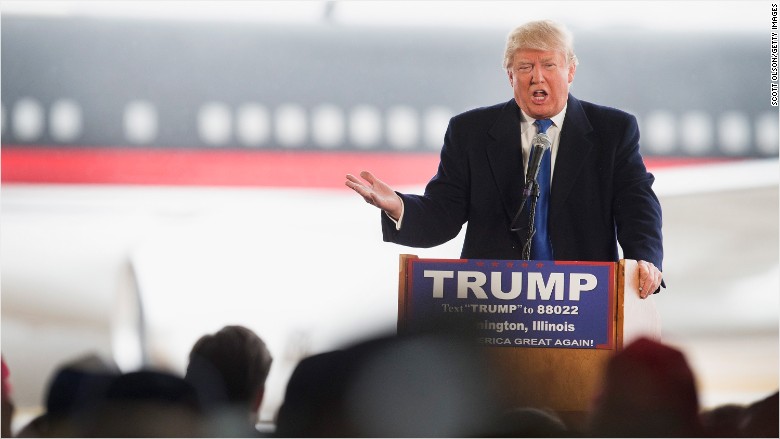
Donald Trump wants to help the slumping oil and gas industry by cutting regulation and encouraging a lot more drilling. He even promised to "save" the coal industry.
Trump laid out his vision in a speech last week, saying "America's incredible energy potential remains untapped" -- a problem that is "totally self-inflicted."
But Trump's energy plan could actually speed coal's demise, not rescue it. And it could deepen the financial stress in the oil and gas industry, already reeling with bankruptcies from a dramatic decline in prices.
Many oil and gas companies can't afford to drill anymore without losing money. They've cut back on new drilling projects -- not because of regulation but because of a glut caused by massive amounts of new supply from the U.S. shale revolution.
So it's hard to see how his proposals would be a cure-all for the industry.
The U.S. is already extracting oil and gas at near record levels -- pumping an average of 9.43 million barrels of oil per day last year, the highest level since 1972 and nearly double the pace of 2008. But that output helped create a big overhang of supply that caused crude to crash as much as 75% to 13-year lows in February. And natural gas production hit an all-time high in 2015.
"They've been so successful with drilling that it's depressed prices," said Gurpal Dosanjh, an energy analyst at Bloomberg Intelligence. "The problem isn't the amount of drilling. It's the glut,"
Related: Donald Trump's energy plan: Regulate less, drill more
Yet Trump, in his first significant remarks on the energy policy, talked about the need to drill more. He proposed lifting existing moratoriums on oil and gas production on federal lands. The presumptive Republican nominee for president also wants to revoke policies that place restrictions on new technologies for drilling.
But it's not clear there is the demand to support new drilling investments. Oil prices have recovered from as low as $26 a barrel in February. They recently touched $50 a barrel but even that is a lot lower compared with above $100 just two years ago. Oil and gas companies have scrapped billions of dollars of projects because they're no longer economical.
Ramping up production would risk renewing the oversupply problem that has started to recede in the last three months.
Red tape not the problem: If he wins the White House, Trump promised to completely scrap any regulation that is "outdated, unnecessary, bad for workers" or contrary to American interests.
That would be a welcome relief to the oil and gas industry. However, it's important to remember that market forces, not regulation, drove a recent decline in production. The U.S. pumped 9.13 million barrels per day in February, down from a recent peak of 9.69 million in April 2015.
"Production will recover when the oil prices make it economic, not because we gut environmental rules that protect air and water," said Jason Bordoff, a professor on energy policy at Columbia University and a former Obama adviser.
Dosanjh agreed that regulators shouldn't get blamed here.
"It's basically self-caused. There aren't too many regulations that are hurting oil, to be honest," said Dosanjh.
However, industry observers said one area where Trump could help is in the building of pipelines to transport oil and natural gas. That could help ensure oil and natural gas supply meets demand. Trump has pledged to approve Keystone XL, the controversial pipeline that President Obama blocked due to environmental concerns.
Related: Hillary Clinton can't kill coal. It's already dying
Coal may not be saveable: And then there's coal. Trump promised to "save" the coal industry -- a sector of the economy that has been rocked by shifting market forces and government efforts to clean up the environment.
"President Obama has done everything he can to kill the coal industry...just ask the people of West Virginia," Trump said.
Coal's struggles were highlighted by the recent bankruptcy of Peabody Energy (BTU), the world's largest private-sector coal producer.
But Trump's energy policy seems inconsistent when it comes to coal. He is a supporter of natural gas production. It is a cleaner source of energy that utilities favor over coal and boosting natural gas could actually further undermine coal.
"As much as the Sierra Club wants to take credit for coal plant closures, it's really been natural gas production that has taken coal away," said Dosanjh.
Bordoff criticized Trump for making an unrealistic promise to coal workers instead of proposing a serious plan to help the struggling coal communities of West Virginia and elsewhere.
"The decline of U.S. coal jobs has been years in the making, driven by multiple factors, and it is irresponsible for a politician to promise to magically bring those jobs back," he said.


